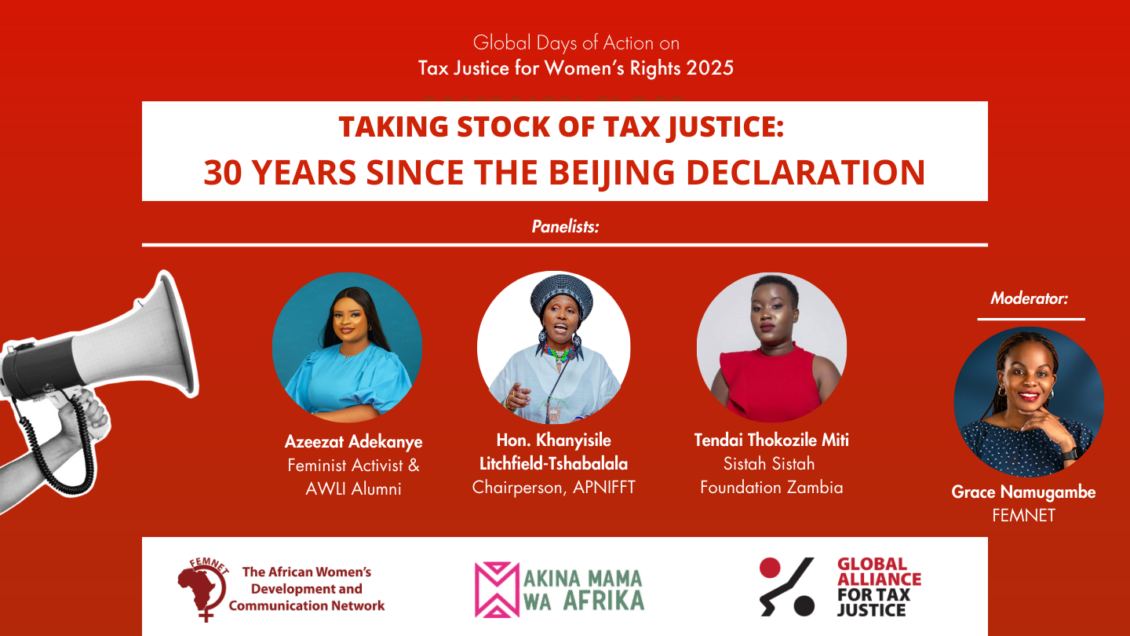Highlights from the webinar on the 30th anniversary of the Beijing Declaration and Platform for Action during the Global Days of Action on Tax Justice for Women’s Rights.
The Beijing Declaration and Platform for Action, adopted in 1995, is a milestone for global gender equality, outlining a framework for addressing women’s rights and empowering women in various sectors. However, 30 years later, significant challenges remain in achieving true gender equality, particularly in the area of economic justice. One key issue that has often been overlooked in global gender justice discussions is tax policy, which plays a critical role in shaping economic opportunities and access to public services. Tax systems, especially in the Global South, often perpetuate gender inequality, especially by underfunding the social organisation of care, which is disproportionately borne by women.
“Despite the promises of the Beijing Declaration and Platform for Action, women all over the world still face significant barriers in achieving economic justice. The economy is sustained through unpaid care work,” shared Azeezat Adekanye, feminist activist & African Women’s Leadership Institute (AWLI) alumni.
“When government debt rises, austerity measures intensify as evident in Kenya’s Finance Bill and the ensuing social movement,” highlighted Adekanye in the webinar.
The webinar, co-organised by Akina Mama wa Afrika, FEMNET, and GATJ, highlighted the need for economic justice for women’s rights. Panelists reflected the achievements and setbacks over the past 30 years since the Beijing Declaration, exploring how tax policies continue to impact women’s economic justice.
Honorable Dr. Khanyisile Litchfield-Tshabalala, Chairperson of the African Parliamentary Network on Illicit Financial Flows and Taxation (APNIFFT), added, “65% of illicit financial flows in Africa are from corporate crimes including tax evasion and avoidance. As an African feminist, tax evasion and avoidance are the same, no matter if the ultra-rich define one as legal and the other as illegal.”
“Patriarchy has locked us out of the economy. Before, women were in control of the market due to work which is now considered informal. If we do not return women to what we controlled before we will not be able to implement the Beijing+30 recommendations,” Hon. Litchfield-Tshabalala added.
Panelists discussed the need to look at the intersection between progressive taxation and gender transformative public services, specifically in the social organisation of care, which remains unrecognized, undervalued and underfunded as a result of the current nature of the global financial architecture which perpetuates neoliberal capitalist interests, colonial legacies, and patriarchal systems.
Tendai Thokozile Miti, Executive Director of Sistah Sistah Foundation Zambia, intervened “Care work, paid or unpaid, is essential for a society to function. But, because of patriarchal, capitalist, and neoliberal structures, care work is not recognised or valued. Tax systems continue to favor corporations over social investment. Corporations continue to have lower tax rates yet we continue to have higher indirect taxes on essential goods. When big corporations and the rich avoid paying taxes we see the burden of taxes shift to women and lower income people through regressive taxation.The privatisation of public services continues to shift the burden of care work to low-income families and women. When our public hospitals are underfunded, women fill that gap.”
Reflecting on how to move forward, Miti and Adekanye highlighted the need to strengthen efforts across movements. Adekanya added, “as feminists advocating for progressive taxation and gender-responsive budgeting, we must recognise that our work is intersectional. We must continue to work across movements with rural people, LGBTQ+ people, and more.” Hon Litchfield-Tshabalala highlighted the need for civil society to advocate with their own governments on the UN Tax Convention to ensure the inclusion of gender equality demands in the text of the Framework Convention and all relevant provisions.
Concluding the webinar, Grace Namugambe, Economic Justice & Rights Officer at the African Women’s Development and Communication Network (FEMNET), stated, “Today, care work, both paid and unpaid, is undervalued in existing economic and tax policies. Tax policies must be leveraged to recognize, reduce, redistribute, reclaim, reward, remunerate, and represent care work and care workers.”
_
About GATJ
The Global Alliance for Tax Justice (GATJ) is a South-led global coalition in the tax justice movement. Together we work for a world where progressive and redistributive tax policies counteract inequalities within and between countries, and generate the public funding needed to ensure essential services and human rights. GATJ coordinates the Tax and Gender Working Group (TGWG) and co-coordinates the Tax Justice Workstream of the CS FfD Mechanism.
About the TGWG
The TGWG was established by the GATJ in 2016 as a dedicated platform for its members and committed partners to directly engage in campaign and policy advocacy efforts on tax and gender issues. It brings together grassroots movements, women’s rights organisations, trade unions, non-governmental organisations, and civil society organisations.
The TGWG has collectively coordinated the annual Global Days of Actions on Tax Justice for Women’s Rights, as well as the publication of Framing Feminist Taxation Guides (volume 1 and volume 2), which provide guidance and recommendations for policy-making and advocacy that can influence and change our current economic and tax systems for a feminist future. Other milestones of the working group also include the first global convening on Tax Justice for Women’s Rights in Bogotá, in 2017; the Bogotá Declaration on Tax Justice for Women’s Rights. In addition to these, working group members collaborate on opinion pieces, policy briefs, workshops, trainings, and actively participate in global, regional and national policy spaces.

